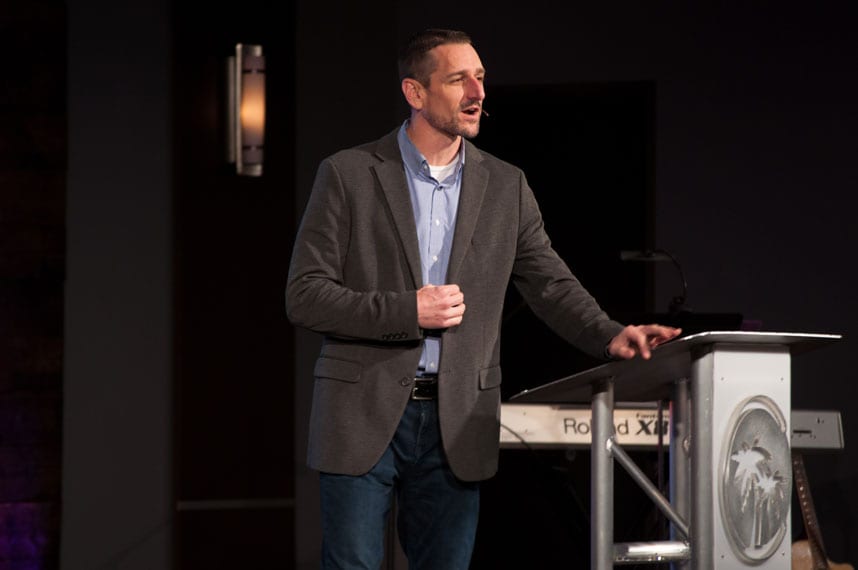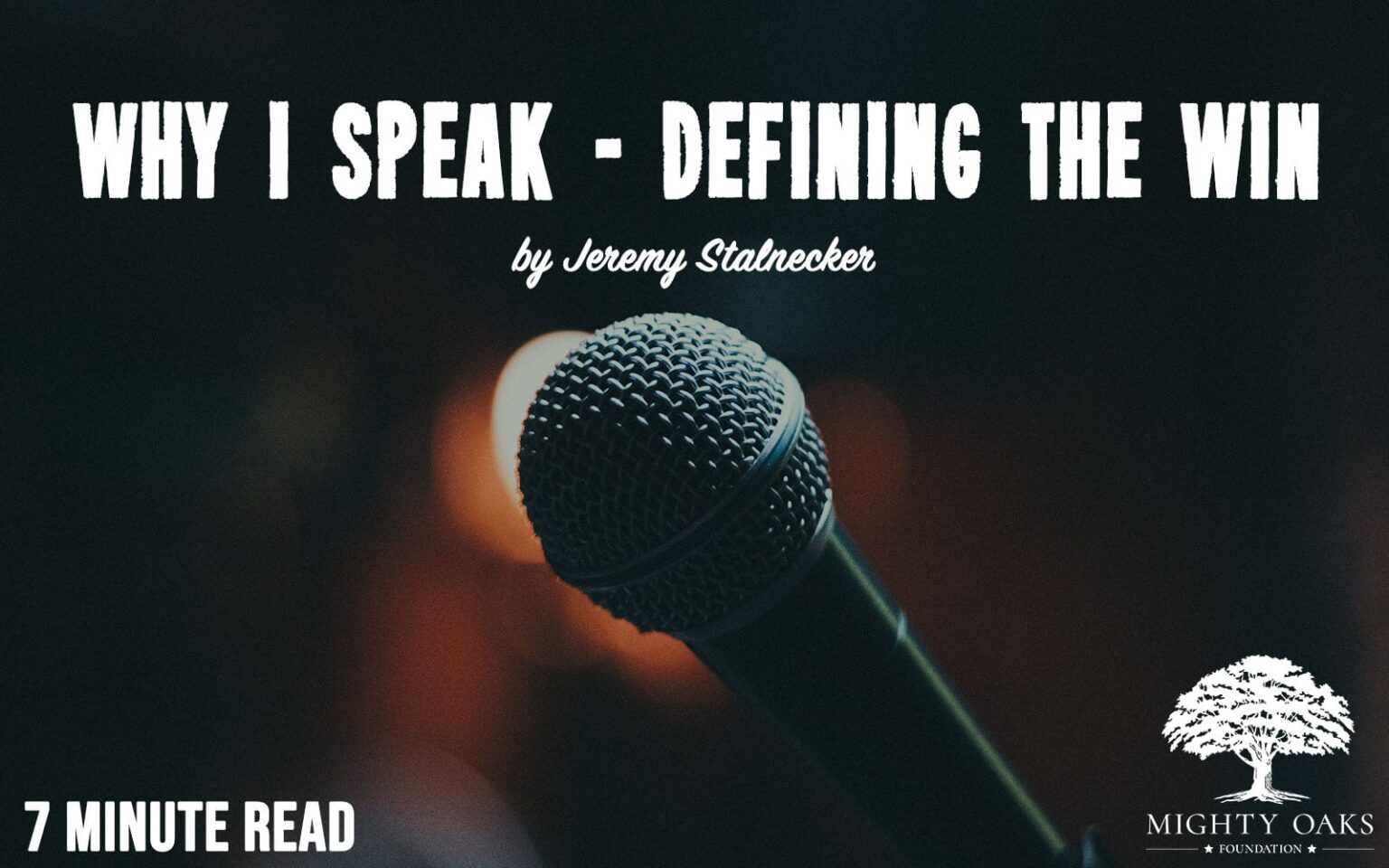From time to time I have the opportunity to speak in front of groups that I have never met. As challenging as any public speaking can be, speaking in a place and in front of people where you have never been can make it even more so. It is a wonderful challenge and one I am grateful for, but it is a challenge nonetheless. I have written before here about WHY I speak and why I believe everyone should, but the why of speaking is often not enough to carry you through when the voice of self-doubt tells you that you are not good enough, are wasting your time, will be laughed out of the building or any of the 100 other things that that voice likes to say. By the way, anyone who tells you that the “self-doubt” voice does not come to them before they speak is either not telling the whole truth or has allowed their self confidence to push them into narcissism (they could also be a sociopath, but that is a different problem). Before you step in front of a group of people and try to share any kind of truth, you have to know exactly what it is you are trying to accomplish. For me at least, the only way to quiet the doubt is to focus on the reason I am there. Since I have already decided what I am trying to accomplish, I focus on that instead of the reasons I should feign illness and go home. Goals also serve as a great reminder that I am not the hero of the event but a guide to help those who are listening move forward in their lives. Having predetermined goals also helps me to evaluate an event when it is over. If I did not accomplish one or more of them, I can make adjustments for next time and continue to grow in my ability to communicate.

I believe that each speaker needs to establish their own goals, but I will share mine to at least get you started. Writing this out also serves as a great reminder to me as I get ready for a weekend of speaking.
What are my goals?
Encourage
I always find it interesting when a speaker communicates through his words and tone that the audience could not function without him. He gives the impression, either intentionally or carelessly, that he is there to fix everything wrong with the people who are graciously listening to his prepared remarks. While I understand that in every audience there are those who simply need help, more on that in a minute, it is also important to recognize that many in the audience are doing the best that they can and need to be encouraged to “keep up the good work”. We often put so much emphasis on the ones who are broken that we overlook those who are not. I want to be, if nothing else, an encourager. I want to encourage those in the audience that need encouragement, I want to encourage those that worked without recognition to put the event on and I want to encourage those volunteers who make it all happen. I am the speaker here to do a job. Without the organizers, volunteers and attendees, I would not be here. They give me the opportunity to do what I love. They need to leave feeling encouraged.
Challenge
Then there are those who do need to be pushed. Those who sit in an audience with often unseen burdens and an unclear future. These folks need to be challenged. They need to be challenged with the truth that whatever situation they are in or whatever burden they are carrying should not define their lives. They need to be challenged to, as author Robert Lewis says, “Reject passivity, accept responsibility and lead courageously.” There are those, and I have talked about this before, who sit in a crowed having already decided that if they don’t receive something to hang on to, they are done. I want to strongly, clearly, and lovingly challenge that person to take the first step forward. For those not struggling quite so badly, I want to issue the challenge to grow and go from where they are. Don’t ever settle. There is more to be done.
Dream
This takes us to the next goal. For some reason, I imagine it is the pressures of being an adult, the older we get the less we dream. When we are young we believe anything is possible and all we have to do is decide which way to go. As we get older, though, we allow the realities of life to stop the dreaming so that we can focus on surviving. I do believe that an adult dreams differently than a child. We need to work and lead and carry the burdens that come with being an adult, but we should never lose hope. We need to believe that as long as we are alive on this earth there is more to do. Hope tells us that there is something beyond our current situation and to dream means we envision that hope becoming reality. I can’t dream for those who listen to what I say, but I can spark the dream if only by making it OK to think outside of the box of day to day life. When we stop dreaming we have stopped living and I want to motivate others to imagine what can be!
Guide
This one is important and I think often overlooked by speakers who simply want to motivate or tell their story. Motivation and story telling are essential ingredients in the toolbox of an effective communicator, but they are the means to an end and not the end itself. Before I walk away from the podium, I want to leave a “call to action” if you will. Having encouraged and challenged and made it OK to dream, I want to leave a road-map for the next few steps ahead. I cannot map out the whole journey, that is as individual as the audience members, but I must leave with a, “if you want to go forward here are some steps that you can take”, moment. This can be simple and often just points to others who can serve as the guide once I have left, but I must encourage action. A roller coaster can be thrilling, and entertaining, and even distracting, but when it’s over, you find yourself right back where you started. A train can be all of those things as well but in the end you have made progress. I want to take my audience forward and then leave them with the next few steps to continue the journey on their own.
Honor
I put this one last, but this is the one goal I MUST accomplish if I will consider a speaking event a success. More than anything I want what I do to honor God. Now I know that may sound simplistic and churchy, but God is the only one who needs to be remembered when I am gone and needs to be the focus while I am there. That does not mean that every talk needs to be a sermon or even that every talk needs to be overtly “faith based”. It does mean that everything I say and do should point others to the true giver of life and hope. We are encouraged as we do the thing for which we were created, we are challenged to align to that purpose, we dream because there is always hope with God and we can move forward as we follow the example He has given to us. It is all about Him! I don’t always get this right, but when I do the topic of the talk doesn’t matter. Those listening walk away understanding that the answer to their question is not found within themselves but in a transcendent God who has a plan for their lives. When I Honor God, I honor the audience.
Understanding the goal of speaking is, to me, absolutely essential. It gives me focus when i’m nervous, clarity when I prepare, and a standard against which to judge an event. Whatever your reason for speaking, or communicating in any medium, I encourage you to understand why and define your win. Do it for you. Do it for your audience.
Read more blogs from Jeremy Stalnecker:
https://jeremystalnecker.com/






